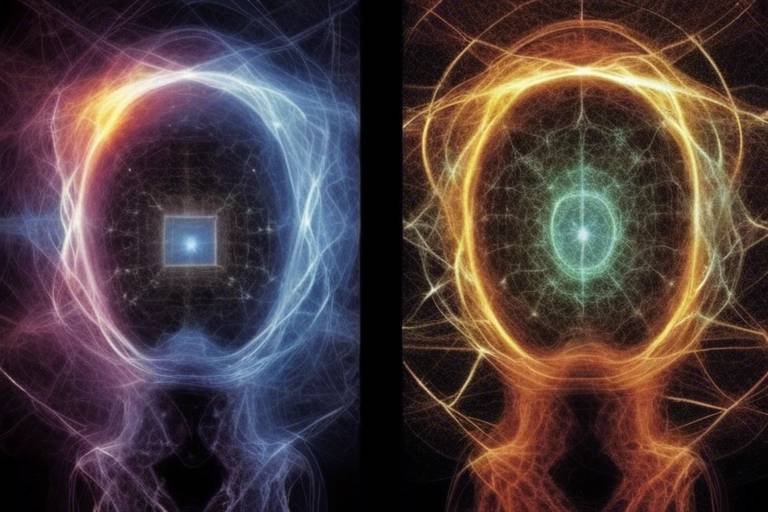Why Metaphysics is the Heart of Philosophy?
Metaphysics, often seen as the backbone of philosophical inquiry, invites us to delve into the profound questions that shape our understanding of existence and reality. Imagine standing at the edge of a vast ocean, where each wave represents a different philosophical question about the universe. Just as the ocean is deep and mysterious, so is the realm of metaphysics, filled with layers of meaning and complexity. At its core, metaphysics seeks to answer the fundamental questions: What is there? What is it like? And how do we know? These inquiries form the foundation from which all other branches of philosophy emerge, making metaphysics not just important but essential.
When we think about metaphysics, we are considering concepts that transcend the physical world. It is the study of what lies beyond what we can see and touch, probing into the nature of reality itself. This exploration is not merely academic; it influences how we perceive our lives and the universe around us. For instance, the metaphysical discussions around free will versus determinism can impact our understanding of moral responsibility. If our actions are predetermined, what does that mean for our choices? Such questions illustrate how metaphysics intertwines with ethics, science, and even theology.
Moreover, metaphysics serves as a bridge connecting various philosophical traditions. From ancient thinkers like Plato and Aristotle to contemporary philosophers, the exploration of metaphysical ideas has shaped diverse schools of thought. Consider how metaphysical theories have evolved over time, adapting to new scientific discoveries and philosophical movements. This adaptability showcases the enduring relevance of metaphysics in addressing the mysteries of existence.
In today's world, where science and technology continue to advance at an unprecedented pace, metaphysics remains a crucial field of inquiry. It challenges us to think critically about the implications of scientific theories and the assumptions that underlie them. For example, quantum mechanics raises questions about the nature of reality that metaphysical perspectives can help illuminate. By examining the fundamental nature of existence, metaphysics encourages us to reflect on our place in the universe and the meaning of our experiences.
Ultimately, metaphysics is the heart of philosophy because it lays the groundwork for all other philosophical inquiries. It encourages us to ask bold questions and seek deeper understanding, prompting a journey that is as enriching as it is enlightening. As we navigate the complexities of existence, metaphysics invites us to embrace the unknown and explore the infinite possibilities that lie ahead.
- What is metaphysics? Metaphysics is a branch of philosophy that explores the fundamental nature of reality, existence, and the universe.
- Why is metaphysics important? It provides a framework for understanding profound questions about existence and influences various fields, including science and ethics.
- How does metaphysics relate to science? Metaphysical assumptions often underpin scientific theories, shaping our understanding of the natural world.
- Can metaphysical beliefs influence ethical decisions? Yes, metaphysical beliefs can significantly impact how individuals perceive their responsibilities and moral reasoning.

The Definition of Metaphysics
Understanding metaphysics is like opening a door to the deepest questions of reality. At its core, metaphysics is the branch of philosophy that delves into the nature of existence, reality, and the universe itself. It seeks to answer profound questions such as: What is there? What is it like? And how do we know? In a way, metaphysics serves as the foundation upon which all other philosophical inquiries are built. Without grasping the essence of metaphysics, one might find themselves lost in the vast sea of philosophical thought.
Metaphysics can be broken down into several fundamental areas that help us navigate its complexities. These include:
- Ontology: This is the study of being and existence. It asks questions like "What does it mean to exist?" and "What categories of being are there?"
- Causality: This aspect examines the relationship between causes and effects, probing into how events occur and the underlying structures that govern them.
- Space and Time: Metaphysics also investigates the nature of space and time, questioning whether they are absolute entities or merely relational constructs.
In essence, metaphysics is not just an abstract field of study; it is a lens through which we can examine and interpret our experiences and the world around us. It challenges us to think beyond the physical and tangible, encouraging a deeper understanding of reality. By engaging with metaphysical questions, we gain insight into the principles that govern our existence and the universe, leading to a more profound appreciation of life itself.
As we navigate through the intricate web of metaphysical concepts, we uncover the profound implications they hold for various fields, including science, ethics, and even art. The questions posed by metaphysics resonate throughout human thought, urging us to explore the fundamental nature of our reality and our place within it.

Historical Context of Metaphysics
To truly grasp the essence of metaphysics, it’s essential to journey back in time and explore its historical context. Metaphysics, often considered the backbone of philosophical inquiry, has evolved from ancient traditions to modern interpretations. Its roots can be traced back to the great thinkers of antiquity, whose ideas laid the groundwork for centuries of philosophical discourse. These early philosophers sought to understand the fundamental nature of reality, existence, and the universe, pondering questions that still resonate today.
In ancient Greece, we encounter the pioneering minds of Plato and Aristotle, whose contributions significantly shaped the landscape of metaphysical thought. Plato, with his Theory of Forms, proposed that beyond our physical world lies a realm of perfect, abstract forms. This idea suggested that the tangible world is merely a shadow of a deeper reality, igniting debates that would last for millennia. Aristotle, on the other hand, introduced a more empirical approach with his Substance Theory, emphasizing the essence of being and categorizing substances based on their properties. These foundational ideas set the stage for future explorations into the fabric of existence.
The influence of metaphysics did not stop with the ancient Greeks. As we moved into the Middle Ages, metaphysical thought intertwined with theology, as scholars sought to reconcile philosophical inquiry with religious beliefs. Thinkers like Thomas Aquinas integrated Aristotelian concepts with Christian doctrine, arguing for the existence of God through metaphysical reasoning. This period marked a significant shift, where metaphysical discussions began to incorporate divine attributes and the nature of the soul.
As we transitioned into the Renaissance and the Enlightenment periods, metaphysics faced new challenges and transformations. The rise of scientific inquiry led to a reevaluation of many metaphysical principles. Philosophers like René Descartes and Immanuel Kant questioned established metaphysical frameworks, introducing skepticism and a focus on human perception. Descartes famously declared, “I think, therefore I am,” emphasizing the role of the self in understanding existence. Kant, meanwhile, sought to bridge the gap between metaphysics and empirical science, proposing that while we can know the phenomena of the world, the noumena—the things-in-themselves—remain elusive.
In more recent times, modern metaphysical perspectives have continued to evolve, incorporating insights from quantum physics and advancements in cognitive science. The interplay between metaphysics and science has grown increasingly complex, as new discoveries challenge traditional metaphysical assumptions. For instance, concepts such as multiverses and quantum entanglement have sparked fresh debates about the nature of reality and existence, pushing the boundaries of metaphysical inquiry.
Overall, the historical context of metaphysics reveals a rich tapestry of thought, where ancient wisdom meets modern skepticism. It’s a journey through time that highlights the enduring quest to understand the universe and our place within it. As we continue to grapple with these profound questions, metaphysics remains a vital field of study, inviting us to explore the mysteries that lie beyond the surface of our everyday experiences.
- What is metaphysics? Metaphysics is the branch of philosophy that studies the fundamental nature of reality, existence, and the universe.
- Who are the key figures in metaphysical thought? Key figures include Plato, Aristotle, Thomas Aquinas, René Descartes, and Immanuel Kant.
- How does metaphysics relate to science? Metaphysics often underpins scientific theories and helps shape our understanding of natural phenomena.
- Is metaphysics still relevant today? Yes, metaphysics remains relevant as it addresses profound questions about existence and reality that continue to intrigue scholars and thinkers.

Ancient Philosophers and Metaphysics
When we delve into the realm of metaphysics, we cannot overlook the profound contributions of ancient philosophers who laid the groundwork for this intricate field of study. Think of metaphysics as the canvas on which these thinkers painted their ideas about existence and reality, using rich colors of thought that still resonate today. Among these early pioneers, Plato and Aristotle stand out as towering figures whose theories continue to shape metaphysical discussions.
Plato, often regarded as the father of Western philosophy, introduced his Theory of Forms, which posits that beyond our tangible world lies a realm of perfect, abstract forms. Imagine a world where the essence of beauty, justice, or goodness exists in its purest form, untouched by the imperfections of our physical reality. For Plato, these forms are the true reality, and everything we perceive is merely a shadow or reflection of these ideal forms. This perspective not only influenced metaphysics but also laid the groundwork for epistemology and ethics, creating ripples across various philosophical domains.
On the other hand, Aristotle, a student of Plato, took a different approach with his Substance Theory. He argued that the essence of being is found in individual substances that make up the world around us. Aristotle categorized substances into different types, such as primary substances (individual entities) and secondary substances (the species or genera of those entities). This categorization provides a foundational framework for understanding existence itself. Imagine walking through a garden; each flower represents a primary substance, while the concept of 'flower' is a secondary substance that categorizes these individual entities. Aristotle's focus on substance paved the way for later metaphysical inquiry, emphasizing the importance of understanding the nature and characteristics of what exists.
Both philosophers, despite their differing views, emphasized the significance of asking fundamental questions about reality. Their dialogues and writings invite us to ponder: What is the nature of existence? How do we categorize the world around us? These inquiries are not just academic; they resonate deeply with our everyday experiences and our quest for understanding.
As we transition from ancient metaphysical thought to modern perspectives, it’s essential to recognize how these foundational ideas have evolved. The seeds planted by Plato and Aristotle have grown into a rich garden of philosophical inquiry, influencing countless thinkers throughout history. Their work serves as a reminder that metaphysics is not just a dry academic subject; it is a vibrant exploration of the very fabric of our reality.
- What is metaphysics? Metaphysics is the branch of philosophy that studies the fundamental nature of reality, existence, and the universe.
- Who are the key figures in ancient metaphysics? The key figures include Plato and Aristotle, who introduced essential concepts that shaped metaphysical thought.
- How does metaphysics relate to other fields of philosophy? Metaphysics serves as a foundation for many other philosophical inquiries, including epistemology, ethics, and logic.
- Is metaphysics still relevant today? Yes, metaphysics remains relevant as it addresses profound questions about existence and reality that continue to influence various fields, including science and ethics.

Plato's Theory of Forms
Plato's Theory of Forms, also known as the Theory of Ideas, is a cornerstone of his metaphysical thought and has profoundly influenced philosophical discourse. At its core, this theory posits that the physical world we perceive is merely a shadow of a higher, more real realm of abstract forms or ideas. Imagine walking through a gallery filled with beautiful paintings; while each painting is unique and captivating, they are mere representations of the true essence of beauty that exists beyond the canvas. This analogy captures the essence of Plato's argument: the tangible world is just a reflection of a more perfect reality.
In Plato's view, these Forms are not just concepts but are the most accurate representations of reality. For instance, consider the Form of a circle. No matter how perfectly a circle is drawn, it will always fall short of the perfect Form of a circle that exists in the realm of ideas. This leads to the conclusion that the physical objects we interact with are imperfect copies of these ideal Forms. Plato categorized these Forms into different realms, primarily distinguishing between the visible world and the intelligible world. The visible world is where we live, filled with imperfect manifestations, while the intelligible world is accessible only through reason and intellect, where the true Forms reside.
Furthermore, Plato's Theory of Forms addresses the nature of knowledge itself. He argues that true knowledge is not derived from sensory experience but from understanding the eternal Forms. This concept challenges the idea that what we see and experience in the physical world constitutes true knowledge. Instead, it suggests that knowledge is a recollection of the Forms that our souls knew before our physical birth. This notion has significant implications for education and philosophy, emphasizing the importance of seeking knowledge beyond mere appearances.
To illustrate the impact of Plato's Theory of Forms, we can consider some key characteristics:
| Characteristic | Description |
|---|---|
| Universality | Forms are universal and unchanging, unlike the particulars in the physical world. |
| Immutability | Forms do not change; they are perfect and eternal, unlike their physical counterparts. |
| Knowledge | True knowledge is the understanding of these Forms, not the physical manifestations. |
In essence, Plato's Theory of Forms invites us to look beyond the surface of our experiences and seek the underlying truths that govern existence. It challenges us to question the nature of reality and encourages a pursuit of knowledge that transcends the material world. This philosophical inquiry is not just an academic exercise; it is a fundamental aspect of human thought, inspiring countless generations to explore the depths of existence and the nature of reality itself.
- What are the Forms according to Plato? The Forms are abstract, perfect, unchanging concepts or ideals that transcend the physical world.
- How does Plato's Theory of Forms relate to knowledge? Plato believed that true knowledge comes from understanding the Forms, rather than relying on sensory experience.
- Why are the Forms considered more real than physical objects? Forms are eternal and immutable, whereas physical objects are temporary and imperfect representations.

Aristotle's Substance Theory
Aristotle's Substance Theory is a cornerstone of his metaphysical framework, intricately woven into the fabric of his philosophy. At its core, this theory seeks to answer the fundamental question: What is the essence of being? Aristotle posits that everything in the universe can be categorized into substances, which are the primary entities that exist independently. Unlike Plato, who emphasized abstract forms, Aristotle grounded his philosophy in the tangible, asserting that substances are the building blocks of reality.
To understand Aristotle's view, it's essential to grasp the distinction he makes between substance and accident. A substance is that which exists in itself, while accidents are properties or qualities that can change without affecting the essence of the substance. For example, consider a tree. The tree itself, with its trunk, branches, and roots, is a substance. However, its color, height, and the number of leaves are accidents that can vary. This distinction is crucial because it allows us to explore the nature of objects and their inherent qualities.
Aristotle further categorizes substances into two main types: primary substances and secondary substances. Primary substances are individual entities, such as a specific dog or a particular tree. Secondary substances, on the other hand, refer to the species or genera to which these individuals belong, like the concept of 'dog' or 'tree' itself. This hierarchical structure lays the groundwork for understanding how individual entities relate to broader categories, providing a comprehensive map of existence.
One of the most profound implications of Aristotle's Substance Theory is its connection to change and permanence. He introduces the idea of hylomorphism, which posits that every substance is a composite of matter and form. Matter refers to the physical substance, while form represents the essence or nature of that substance. This duality allows for change; when a substance undergoes transformation, it is the form that evolves while the matter remains constant. For instance, when a sculptor carves a statue from a block of marble, the marble (matter) retains its existence even as the form changes from a rough block to a detailed figure.
Aristotle's exploration of substance doesn't just stop at categorization; it extends into the realm of causation. He identifies four types of causes that explain why a substance exists in its current form: the material cause (what something is made of), the formal cause (the form or essence), the efficient cause (the agent or process that brings it into being), and the final cause (the purpose or function it serves). This comprehensive approach to understanding substances highlights the interconnectedness of existence, suggesting that nothing exists in isolation but rather as part of a larger web of relationships.
In summary, Aristotle's Substance Theory offers a robust framework for exploring the essence of being and the nature of reality. By categorizing substances and examining their properties, he provides a lens through which we can understand the world around us. This theory not only influences metaphysical discussions but also lays the groundwork for various fields of study, including science and ethics, by emphasizing the importance of understanding the fundamental nature of things.
- What is Aristotle's view on substance? Aristotle believes that substances are the primary entities that exist independently and are essential for understanding reality.
- How does Aristotle differentiate between primary and secondary substances? Primary substances are individual entities, while secondary substances refer to the broader categories or species to which these individuals belong.
- What is hylomorphism? Hylomorphism is the idea that every substance is a combination of matter and form, allowing for change while maintaining existence.
- What are the four causes in Aristotle's philosophy? The four causes are material cause, formal cause, efficient cause, and final cause, each explaining different aspects of why a substance exists in its current form.

Modern Metaphysical Perspectives
In the ever-evolving landscape of philosophy, have emerged as a dynamic response to the challenges posed by scientific advancements and contemporary thought. Unlike the rigid frameworks of ancient philosophy, modern metaphysics embraces a more fluid understanding of reality, often intertwining with disciplines such as physics, psychology, and even technology. This shift invites us to question: What does it mean to exist in a world where our understanding of reality is constantly being reshaped?
One of the most intriguing aspects of modern metaphysical thought is its ability to adapt and integrate new findings. For instance, the rise of quantum mechanics has led to fascinating discussions about the nature of reality. In this realm, particles can exist in multiple states at once, challenging our traditional notions of existence and causality. The implications of such scientific theories extend beyond physics, prompting metaphysicians to reconsider foundational questions about the universe and our place within it.
Moreover, modern metaphysics often addresses issues of consciousness and identity. Philosophers like Daniel Dennett and David Chalmers have sparked debates about whether consciousness is a fundamental aspect of the universe or merely a byproduct of physical processes. This leads us to ponder: Are we merely biological machines, or do we possess an essence that transcends the physical? Such questions underscore the relevance of metaphysics in understanding not just the universe, but also ourselves.
Another significant trend in modern metaphysical perspectives is the influence of postmodernism. This movement challenges the idea of objective truths, suggesting that reality is subjective and constructed through language and culture. As a result, metaphysical inquiry has become more inclusive, considering diverse perspectives and experiences. This shift encourages a broader dialogue about what constitutes reality and existence, inviting voices from various backgrounds to contribute to the discussion.
To illustrate the diversity of modern metaphysical thought, consider the following table that summarizes key perspectives:
| Perspective | Key Thinkers | Main Ideas |
|---|---|---|
| Quantum Metaphysics | David Bohm, Niels Bohr | Reality is interconnected, and particles exist in multiple states. |
| Philosophy of Mind | Daniel Dennett, David Chalmers | Explores the nature of consciousness and its relationship to the physical. |
| Postmodern Metaphysics | Michel Foucault, Jacques Derrida | Reality is subjective and constructed through language and cultural narratives. |
In conclusion, modern metaphysical perspectives reflect a rich tapestry of ideas that continue to challenge and inspire us. By engaging with these contemporary discussions, we not only expand our understanding of existence but also open ourselves to new possibilities and interpretations of reality. As we navigate this complex landscape, we are reminded that the questions we ask are just as important as the answers we seek.
- What is metaphysics? Metaphysics is the branch of philosophy that explores the fundamental nature of reality, existence, and the universe.
- How has metaphysics evolved over time? Metaphysics has evolved from ancient philosophical traditions to incorporate modern scientific discoveries and diverse perspectives.
- Why is metaphysics important today? It helps us address profound questions about existence and informs various fields, including science, ethics, and theology.
- What role does consciousness play in modern metaphysics? Consciousness is a central topic, with debates about its nature and relationship to the physical world shaping contemporary thought.

Key Concepts in Metaphysics
Metaphysics is a vast and intricate field that dives deep into the essence of reality. It is not merely a collection of abstract ideas but a crucial framework that underpins many philosophical inquiries. At its core, metaphysics seeks to answer profound questions about existence and the nature of the universe. Among the myriad of concepts it encompasses, three stand out as particularly pivotal: ontology, causality, and time.
Ontology is the branch of metaphysics that deals with the nature of being. It probes into what it means to exist and categorizes different modes of being. Imagine ontology as a map of existence, where every entity, from the tiniest atom to the vast cosmos, has its place. This exploration leads to questions like: What constitutes reality? Are abstract concepts like numbers or love as real as physical objects? Through ontology, philosophers attempt to categorize entities into various groups, such as concrete vs. abstract, or particular vs. universal, which helps to clarify our understanding of the world around us.
Next, we have causality, which examines the relationship between cause and effect. This concept is fundamental in understanding how events unfold in our universe. Think of causality as a chain reaction; one event triggers another, creating a ripple effect throughout reality. This leads to intriguing inquiries: Do causes always precede their effects? Can we have effects without identifiable causes? Causality challenges us to think critically about how we perceive events and whether our understanding of time and space is linear or more complex. The implications of causality stretch far beyond philosophy, influencing fields like science and ethics.
Finally, time is perhaps one of the most elusive concepts in metaphysics. It is a dimension we all experience, yet its true nature remains a mystery. Is time a linear progression from past to future, or is it cyclical? Some philosophers argue that time is merely a construct of human perception, while others assert that it has an objective reality independent of our experiences. This ongoing debate raises fascinating questions: How does our understanding of time influence our existence? If time is not absolute, how do we make sense of change and continuity in our lives? These inquiries highlight the importance of time in metaphysical discussions, as it shapes our understanding of existence itself.
In summary, the key concepts of ontology, causality, and time form the backbone of metaphysical inquiry. They challenge us to think deeply about the nature of reality and our place within it. Understanding these concepts not only enriches our philosophical knowledge but also enhances our comprehension of the world we inhabit. As we continue to explore these themes, we find that metaphysics remains a vital area of study, one that encourages curiosity and critical thinking.
- What is metaphysics? Metaphysics is a branch of philosophy that explores the fundamental nature of reality, existence, and the universe.
- Why is ontology important? Ontology helps us categorize and understand different modes of being, aiding our comprehension of the world and existence.
- How does causality affect our understanding of reality? Causality examines the relationship between events, influencing our perception of how things unfold in the universe.
- What are the implications of time in metaphysics? Time's nature prompts questions about existence, change, and our understanding of reality, making it a central topic in metaphysical discussions.

Ontology: The Study of Being
Ontology, often regarded as the cornerstone of metaphysics, is the philosophical study that delves into the essence of being and existence. It raises fundamental questions that resonate through the ages, such as: What does it mean to exist? What kinds of things exist? And how do we categorize these entities? At its core, ontology seeks to understand the nature of reality itself, providing a framework to explore everything from the material to the abstract.
To truly grasp ontology, one must consider its various branches and categories. It is not merely about cataloging entities but also about understanding the relationships and hierarchies that exist among them. For instance, ontologists might explore concepts such as:
- Substance: What constitutes the fundamental building blocks of reality?
- Properties: How do attributes or characteristics relate to the substances they describe?
- Relations: In what ways do different entities interact with one another?
Furthermore, ontology can be divided into two primary categories: general ontology, which examines the most universal aspects of existence, and special ontology, which focuses on specific kinds of entities, such as physical objects, abstract concepts, or even social constructs. This division allows philosophers to tailor their inquiries and engage with the complexities of different types of existence.
One of the most intriguing aspects of ontology is its application in various fields. For example, in science, ontological assumptions underpin many theories. Scientists often operate under the premise that certain entities exist, whether they be particles, forces, or even entire ecosystems. In artificial intelligence, ontological frameworks help in structuring knowledge bases and enabling machines to understand and navigate the world. Thus, ontology not only enriches philosophical discourse but also has practical implications in our technological and scientific advancements.
In conclusion, ontology is not just an abstract pursuit; it is a vital inquiry into the fabric of reality that influences numerous fields and disciplines. By examining the nature of being, we gain insight into our own existence and the world around us, prompting us to question and reflect on the very essence of life itself.
- What is the primary focus of ontology?
Ontology focuses on the study of being and existence, exploring what it means to exist and the categories of being. - How does ontology relate to other branches of philosophy?
Ontology serves as a foundational aspect of metaphysics and interacts with other branches like epistemology, ethics, and logic. - Can ontology influence scientific theories?
Yes, ontological assumptions often underpin scientific theories, affecting how scientists conceptualize and categorize entities in the natural world.

Causality and Its Implications
Causality is one of the cornerstones of metaphysical inquiry, representing the intricate web that connects events and phenomena in our universe. At its core, causality seeks to answer one of the most profound questions: What causes things to happen? This question is not merely academic; it touches on our everyday experiences and the way we understand the world around us. When we drop a ball, we expect it to fall due to the force of gravity. But what does that really mean in a metaphysical sense? Is gravity the ultimate cause, or is there something deeper at play? This exploration of cause and effect leads us to delve into the nature of reality itself.
To grasp the implications of causality, we must consider how it shapes our understanding of time and existence. In many philosophical traditions, causality is linked to the concept of time, where causes precede their effects. This temporal relationship raises intriguing questions: Can an effect exist without a cause? Are there events that occur randomly, defying our intuitive sense of causation? These inquiries challenge the deterministic view that everything is preordained by prior events, suggesting instead a more complex interplay between chance and necessity.
Moreover, causality has significant implications in various fields, including science, ethics, and even our personal lives. In science, for example, causal relationships are foundational to the scientific method. Scientists formulate hypotheses based on observed correlations, seeking to establish cause-and-effect relationships through experimentation. The famous philosopher David Hume famously questioned the reliability of our understanding of causality, arguing that we can never truly observe causation; we only see events occurring in succession. This skepticism invites us to reconsider how we interpret scientific data and the conclusions we draw from it.
In ethics, causality influences how we perceive moral responsibility. If we believe that every action has a corresponding effect, we might hold individuals accountable for their actions, believing they are the causes of the outcomes that follow. For instance, if someone acts recklessly and causes harm, the causal link between their action and the harm done can lead to moral and legal repercussions. This perspective raises vital questions about free will and determinism: Are we truly responsible for our actions if they are merely the result of preceding causes?
In summary, the implications of causality are vast and multifaceted, extending far beyond the realm of philosophy into everyday life. Our understanding of causality not only shapes our scientific endeavors but also influences our ethical frameworks and personal accountability. As we continue to explore the nature of cause and effect, we uncover deeper truths about existence and our place in the universe.
- What is causality in metaphysics?
Causality in metaphysics refers to the relationship between causes and effects, exploring how events are interconnected and the principles that govern these connections. - How does causality affect our understanding of time?
Causality suggests that causes precede their effects, which is a fundamental aspect of our understanding of time and the sequence of events. - Is causality always deterministic?
No, while many philosophical traditions advocate for a deterministic view of causality, others suggest that randomness and chance also play a significant role in the unfolding of events. - What are the ethical implications of causality?
Causality influences our perceptions of moral responsibility, as it links actions to their consequences, raising questions about accountability and free will.

The Relevance of Metaphysics Today
In our fast-paced, technology-driven world, one might wonder: does metaphysics still hold any significance? The answer is a resounding yes. While some critics argue that metaphysics is outdated or irrelevant, its influence permeates various fields, continuously shaping our understanding of existence and reality. Think of metaphysics as the underlying framework of a grand architectural structure; without it, the entire edifice of human thought would collapse into chaos.
At its core, metaphysics addresses profound questions about existence, reality, and the universe. These inquiries are not just academic; they resonate deeply in our everyday lives. For instance, when we ponder the nature of time or the essence of being, we engage in metaphysical contemplation. Such reflections can lead to greater self-awareness and a more profound understanding of our place in the universe.
Moreover, metaphysics has a significant impact on various disciplines, including:
- Science: The relationship between metaphysics and science is intricate. Scientific theories often rest on metaphysical assumptions. For example, the nature of space and time is a metaphysical question that underpins much of modern physics. Without a solid metaphysical foundation, scientific inquiry would lack coherence.
- Ethics: Our metaphysical beliefs can shape our ethical frameworks. For instance, if one believes in a deterministic universe, it may influence their views on moral responsibility. In contrast, a belief in free will can lead to different ethical implications, affecting how we perceive justice and accountability.
- Theology: Metaphysics plays a crucial role in religious and spiritual discussions. Questions about the existence of a higher power, the nature of the soul, and the afterlife are deeply metaphysical. These discussions can guide individuals in their spiritual journeys and influence community beliefs.
In today's world, where scientific advancements challenge traditional metaphysical views, the field has evolved, incorporating new philosophical ideas that expand its scope. For example, the rise of quantum mechanics has prompted questions about the nature of reality that were once considered purely metaphysical. This interplay between science and metaphysics invites a richer dialogue, encouraging us to rethink our assumptions about the universe.
Ultimately, the relevance of metaphysics today lies in its ability to provoke thought and inspire inquiry. It encourages us to ask the big questions that define our existence and to explore the unknown. In doing so, metaphysics not only enriches our intellectual landscape but also enhances our understanding of what it means to be human.
- What is metaphysics? Metaphysics is the branch of philosophy that studies the fundamental nature of reality, existence, and the universe.
- Why is metaphysics important? It provides a framework for understanding profound questions about existence and influences various fields, including science, ethics, and theology.
- How does metaphysics relate to science? Metaphysical assumptions often underpin scientific theories, shaping our understanding of the natural world.
- Can metaphysical beliefs impact ethics? Yes, metaphysical beliefs can significantly influence moral reasoning and how individuals perceive their responsibilities.

Metaphysics in Science
When we think about science, we often picture precise measurements, laboratory experiments, and observable phenomena. However, lurking beneath the surface of empirical data is a rich tapestry of metaphysical assumptions that shape our understanding of the universe. Much like a hidden foundation supports a grand building, metaphysics underpins scientific inquiry, influencing how we interpret the world around us. For instance, consider the very nature of reality that science seeks to explore: what does it mean for something to exist? This question, steeped in metaphysical thought, guides scientists as they formulate hypotheses and develop theories.
One of the most significant ways metaphysics intersects with science is through the concept of causality. Scientists often operate under the assumption that every effect has a cause, a principle that is not just a scientific observation but a deeply metaphysical claim. This belief shapes the framework within which scientific laws are formulated. Without this assumption, the entire structure of scientific inquiry would crumble, leaving us with mere observations devoid of meaning. Think of it like a detective story: without the assumption that every clue leads to a cause, the mystery remains unsolved, and the narrative falls apart.
Moreover, metaphysics also plays a crucial role in the realm of theoretical physics. Theories such as quantum mechanics and relativity challenge our traditional notions of time, space, and reality itself. For example, quantum entanglement presents a scenario where particles appear to be interconnected regardless of distance, prompting metaphysical questions about the nature of reality and existence. Are these particles truly separate entities, or do they exist in a shared state of being? Such inquiries push the boundaries of both science and metaphysics, creating a dialogue that promotes deeper understanding.
In addition to causality and theoretical frameworks, metaphysical questions also arise in the context of scientific realism versus anti-realism. Scientific realism posits that the entities described by science, such as electrons or gravitational waves, exist independently of our observations. In contrast, anti-realism suggests that these entities are merely useful fictions that help us navigate the world. This debate is not merely academic; it has profound implications for how we understand scientific progress and the nature of truth. To illustrate this, consider the following table that outlines key differences between these two perspectives:
| Aspect | Scientific Realism | Anti-Realism |
|---|---|---|
| Existence of Entities | Entities exist independently of observation. | Entities are constructs useful for explanation. |
| Truth | Truth is objective and corresponds to reality. | Truth is subjective and context-dependent. |
| Scientific Progress | Progress is a closer approximation of reality. | Progress is about developing better models. |
Ultimately, the relationship between metaphysics and science is not one of opposition but of collaboration. They are two sides of the same coin, each enriching the other. Metaphysics provides the philosophical groundwork that allows science to flourish, while scientific discoveries challenge and refine our metaphysical beliefs. So, the next time you marvel at a scientific breakthrough, take a moment to ponder the metaphysical questions it raises. After all, in the grand quest for knowledge, both science and metaphysics are indispensable allies in our pursuit of understanding.
- What is metaphysics? Metaphysics is the branch of philosophy that explores the fundamental nature of reality, existence, and the universe.
- How does metaphysics relate to science? Metaphysics underpins scientific inquiry by providing foundational assumptions about existence, causality, and the nature of reality.
- Can science exist without metaphysics? No, science relies on metaphysical assumptions to interpret data and formulate theories about the natural world.
- What are some key metaphysical concepts in science? Key concepts include causality, the nature of existence, and the debate between scientific realism and anti-realism.

Ethical Implications of Metaphysical Beliefs
When we dive into the realm of metaphysics, we're not just pondering abstract concepts; we're also exploring the very foundation of our ethical beliefs. It's fascinating to think about how our understanding of existence and reality shapes our moral compass. Imagine metaphysics as the roots of a tree, with ethics being the branches that reach out into the world. If the roots are twisted or unhealthy, the branches may not bear good fruit. This analogy highlights the essential connection between metaphysical beliefs and ethical reasoning.
Metaphysical beliefs can significantly influence how we perceive our responsibilities and the nature of good and evil. For instance, if one subscribes to a metaphysical view that emphasizes determinism—the idea that all events, including moral choices, are determined by preceding events—this could lead to a more fatalistic approach to ethics. Individuals may feel less accountable for their actions, believing that they are merely products of a predetermined universe. Conversely, a belief in free will can foster a sense of personal responsibility and moral agency, encouraging individuals to act ethically and make conscious choices.
Moreover, the metaphysical understanding of the self plays a crucial role in ethical considerations. If one believes in a dualistic view, where the mind and body are separate, it may lead to ethical dilemmas regarding the treatment of the body versus the mind. On the other hand, a more holistic view of the self, where mind and body are interconnected, can promote a more compassionate and integrated approach to ethics. This perspective emphasizes the importance of caring for both our mental and physical well-being, ultimately leading to a more balanced ethical framework.
Let's not forget about the implications of metaphysical beliefs on concepts like justice and morality. Different philosophical traditions offer various interpretations of what constitutes a "just" society. For example, in some Eastern philosophies, the idea of karma—rooted in metaphysical beliefs about cause and effect—shapes ethical behavior and societal norms. In contrast, Western philosophies may emphasize individual rights and freedoms, influenced by metaphysical ideas about the nature of the self and existence.
In summary, the interplay between metaphysical beliefs and ethics is profound and multi-faceted. It invites us to reflect on our beliefs about existence, agency, and the nature of reality, ultimately shaping our moral framework. As we continue to explore these connections, we may find that a deeper understanding of metaphysics enriches our ethical lives, guiding us toward more thoughtful and responsible choices.
- What is metaphysics? Metaphysics is a branch of philosophy that explores the fundamental nature of reality, including concepts such as existence, being, and the universe.
- How does metaphysics relate to ethics? Metaphysical beliefs can influence our understanding of morality, responsibility, and the nature of good and evil, shaping our ethical frameworks.
- Can metaphysical beliefs change over time? Yes, metaphysical beliefs can evolve based on new philosophical insights, scientific discoveries, and cultural shifts, leading to changes in ethical perspectives.
- Why is it important to study metaphysics? Studying metaphysics helps us understand the foundational questions of existence and reality, which can enhance our comprehension of various philosophical and ethical issues.
Frequently Asked Questions
- What is metaphysics?
Metaphysics is a branch of philosophy that explores the fundamental nature of reality, existence, and the universe. It delves into questions like what it means to exist, the nature of objects and their properties, and the relationships between mind and matter.
- Why is metaphysics considered the heart of philosophy?
Metaphysics is often seen as the heart of philosophy because it lays the groundwork for understanding all other philosophical inquiries. By examining the fundamental principles of reality, it influences ethics, epistemology, and even science, making it central to philosophical thought.
- Who are some key figures in metaphysical thought?
Key figures include ancient philosophers like Plato and Aristotle, who introduced essential concepts such as the Theory of Forms and Substance Theory. Their ideas continue to shape metaphysical discussions and influence modern philosophy.
- What role does ontology play in metaphysics?
Ontology is a core branch of metaphysics that investigates the nature of being and existence. It addresses questions about what entities exist, what it means to exist, and how different categories of being interact with one another.
- How does metaphysics relate to modern science?
The relationship between metaphysics and science is complex. While science relies on empirical evidence, metaphysical assumptions often underpin scientific theories, helping to shape our understanding of the natural world and the laws that govern it.
- Can metaphysical beliefs influence ethical theories?
Absolutely! Metaphysical beliefs can significantly impact ethical theories by shaping how individuals perceive concepts like good and evil, responsibility, and moral obligations. Understanding these beliefs can provide deeper insights into ethical reasoning.
- Is metaphysics still relevant today?
Yes, metaphysics remains highly relevant today. It continues to provide a framework for addressing profound questions about existence, reality, and the universe. Its influence can be seen across various fields, including science, ethics, and theology.
- What are some common misconceptions about metaphysics?
One common misconception is that metaphysics is purely abstract and disconnected from reality. In reality, it engages with fundamental questions that underpin our understanding of the world, making it both practical and essential to philosophical inquiry.



















